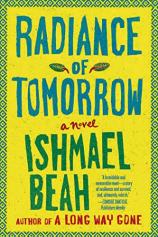Radiance of Tomorrow
Review
Radiance of Tomorrow
RADIANCE OF TOMORROW promises hopefulness and anticipation for better things, and Ishmael Beah delivers on this pledge in his first novel. However, be prepared for stories of the mutilation and destruction of families, their homes and culture. Always lurking in the background is the threat of another horrific piece of information about the civil war in Sierra Leone.
Along with other survivors of the massacres during the war, two teachers, Bockarie and Benjamin, return to Imperi. They come back with their families because it is their home and they want to reestablish connections to the land, the other villagers, and the school. The tattered remains of the village slowly rebuild; their perseverance in paying tuition and walking miles to the building where the school is held shows their belief in the importance of education.
Beah explains why storytelling is vital, especially to a culture that has lost almost everything. Whatever godliness within each person departs temporarily during the war they endured, they are now “empty vessels” that can be filled with anything. The stories and the old ways will fill them again, and they will come into contact with life and godliness. Other things also come, but the practical ones must come first: food, water, shelter.
"RADIANCE OF TOMORROW promises hopefulness and anticipation for better things, and Ishmael Beah delivers on this pledge in his first novel. However, be prepared for stories of the mutilation and destruction of families, their homes and culture."
The unannounced invasion of foreigners to mine for rutile (a mineral consisting of titanium dioxide) is only the cover for the diamonds they hope to find. The trucks, dredges and electricity further disrupt the fragility of life in Imperi and the surrounding villages. White or black, these mine workers bring bribes, Toyotas, Heineken and prostitution, which change the fabric of lives once again. The people of Imperi believed they would be left alone for a period of time in order to re-establish their lives. This does not happen.
The pervasive grossness of the intruders is shown again and again, illustrated by a worker named John, who chooses to urinate on the benches and walls of a meeting place. Generations of wise men and women had sat on these benches and within these walls to discuss important issues. He amuses some of the younger people before one of the elders comes and tries to embarrass him. After zipping up his pants, he heads to the bar for more beer to create more urine.
Beah is at his best showing the tension and futility of an irrational world; the actions of the mine owners and the corrupt local police will enrage and frustrate all readers. We also recognize the universal situations of greed and exploitation overcoming human threads of decency. However, Beah loses the sense of place for me in the last section as the two friends must resort to going to work for the mining company because they cannot survive on teachers’ salaries. Too many events crash together as the story moves to Freeland, the capital of Sierra Leone. He rushes us: there is little description or time for contemplation until the very end when, near starvation, Bockarie, his wife and their children eat rice, potato leaves and fish, a gift from a friend. Oumu, their wise daughter, asks her mother to tell a story. And she does.
The promise of radiance will not be kept in the village of Imperi but rather in the hearts and spirits of the survivors, storytellers, teachers and children.
In the “Preface,” Beah gives examples of how difficult it was to find English equivalences of things he wanted to say in Mende, his mother tongue, a very expressive language. There is no phrase for “the night came suddenly” in Mende; instead, you say “the sky rolled over and changes its sides.” And the word “ball” translates to “a nest of air” or “a vessel that carries air.” Beautiful phrases like these caught me every time, making me slow down and re-read to be sure I understood. There is much more to this story than the story itself.
Reviewed by Jane Krebs on January 9, 2014
Radiance of Tomorrow
- Publication Date: January 6, 2015
- Genres: Fiction
- Paperback: 272 pages
- Publisher: Sarah Crichton Books
- ISBN-10: 0374535035
- ISBN-13: 9780374535032





